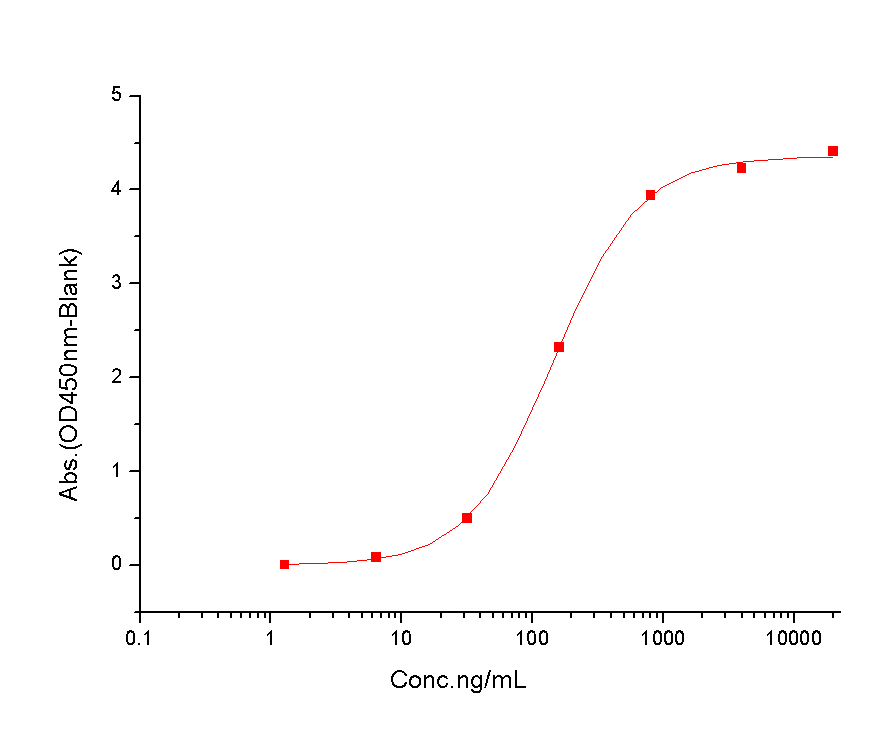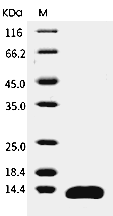Shopping Cart
- Remove All
 Your shopping cart is currently empty
Your shopping cart is currently empty

Leptin Protein, Human, Recombinant is expressed in E. coli expression system. The predicted molecular weight is 16 kDa and the accession number is A4D0Y8.

| Pack Size | Price | Availability | Quantity |
|---|---|---|---|
| 100 μg | $57 | In Stock |
| Biological Activity | Immobilized Human Leptin at 2 μg/mL (100 μL/well) can bind Human Leptin Receptor (His & hFc Tag), the EC50 of Human Leptin Receptor (His & hFc Tag) is 70-420 ng/mL.  |
| Description | Leptin Protein, Human, Recombinant is expressed in E. coli expression system. The predicted molecular weight is 16 kDa and the accession number is A4D0Y8. |
| Species | Human |
| Expression System | E. coli |
| Tag | Tag Free |
| Accession Number | A4D0Y8 |
| Synonyms | OBS,OB,leptin,LEPD |
| Construction | A DNA sequence encoding the mature form of human Leptin (NP_000221.1) (Val 22-Cys 167) was expressed, with an additional Met. Predicted N terminal: Met |
| Protein Purity | > 98 % as determined by SDS-PAGE  |
| Molecular Weight | 16 kDa (predicted); 13 kDa (reducing conditions) |
| Endotoxin | Please contact us for more information. |
| Formulation | Lyophilized from a solution filtered through a 0.22 μm filter, containing PBS, pH 7.4. Typically, a mixture containing 5% to 8% trehalose, mannitol, and 0.01% Tween 80 is incorporated as a protective agent before lyophilization. |
| Reconstitution | A Certificate of Analysis (CoA) containing reconstitution instructions is included with the products. Please refer to the CoA for detailed information. |
| Stability & Storage | It is recommended to store recombinant proteins at -20°C to -80°C for future use. Lyophilized powders can be stably stored for over 12 months, while liquid products can be stored for 6-12 months at -80°C. For reconstituted protein solutions, the solution can be stored at -20°C to -80°C for at least 3 months. Please avoid multiple freeze-thaw cycles and store products in aliquots. |
| Shipping | In general, Lyophilized powders are shipping with blue ice. |
| Research Background | Leptin is one of the most important hormones secreted by adipocytes, as an adipokine that modulates multiple functions including energy homeostasis, thermoregulation, bone metabolism, endocrine, and pro-inflammatory immune responses. The circulating leptin levels serve as a gauge of energy stores, thereby directing the regulation of energy homeostasis, neuroendocrine function, and metabolism. Recent studies suggest that leptin is physiologically more important as an indicator of energy deficiency, rather than energy excess, and may mediate adaptation by driving increased food intake and directing neuroendocrine function to converse energy, such as inducing hypothalamic hypogonadism to prevent fertilization. One of these functions is the connection between nutritional status and immune competence. The adipocyte-derived hormone Leptin has been shown to regulate the immune response, innate, and adaptive response, both in normal and pathological conditions. Thus, Leptin is a mediator of the inflammatory response. Leptin has a dual effect on bone, acting by two independent mechanisms. As a signal molecule with growth factor characteristics, leptin can stimulate osteoblastic cells and inhibit osteoclast formation and activity, thus promoting osteogenesis. However, as a molecule that stimulates sympathetic neurons in the hypothalamus, leptin indirectly inhibits bone formation. This inhibitory effect of leptin mediated by activation of the sympathetic nervous system can be abrogated by the application of blood pressure-reducing beta-blockers, which also inhibit receptors of hypothalamic adrenergic neurons. Leptin appears to regulate some features defining Alzheimer's disease (AD) at the molecular and physiological level. Leptin can stimulate mitogenic and angiogenic processes in peripheral organs. Because leptin levels are elevated in obese individuals and excess body weight has been shown to increase breast cancer risk in postmenopausal women. Furthermore, a recent report clearly shows that targeting leptin signaling may reduce mammary carcinogenesis. |

Copyright © 2015-2025 TargetMol Chemicals Inc. All Rights Reserved.